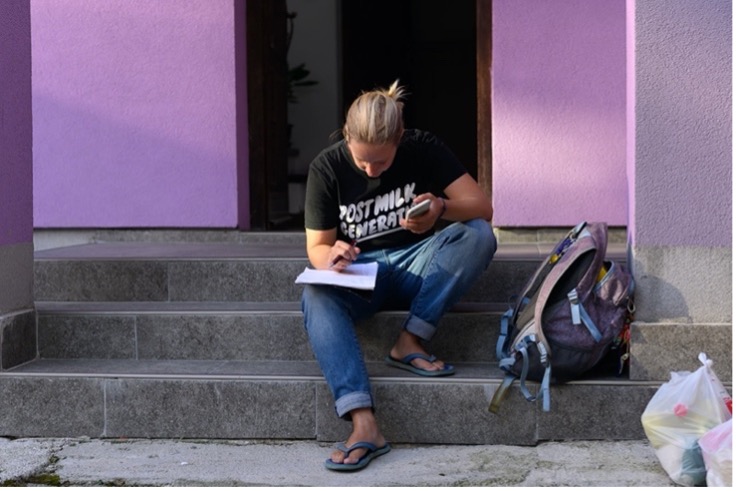During the pandemic, Hannah Parry, a freelance journalist from the UK, volunteered in the Balkans supporting people moving from the Middle East and Africa, hoping for security and safety in Europe. It was in Bosnia that she met Sahar, a Christian gay woman fleeing Iran to reunite with her sister in Germany. While reporting illegal pushbacks for the Border Violence Monitoring Network, Hannah listened to Sahar, who revealed uncountable violations of human rights migrant communities face within the borders of Europe.
by Hannah Parry picture by Sonia Remizua @Unsplash
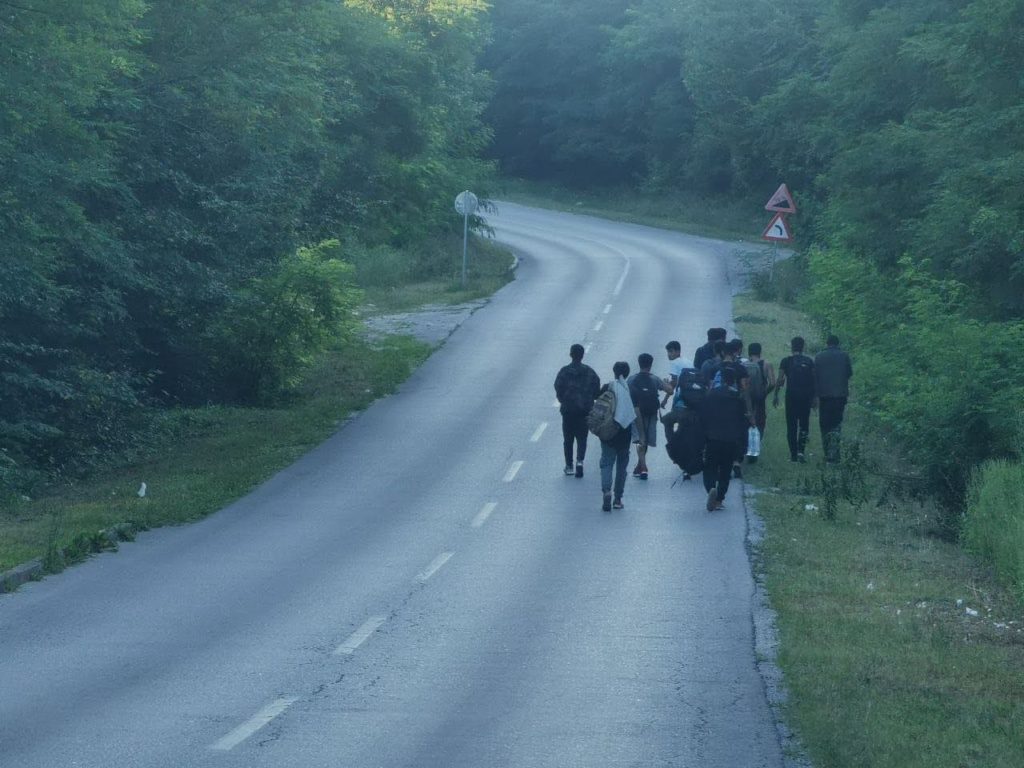
I was sitting at the restaurant across the road from the Sedra Camp when I first met Sahar in the summer of 2020. A small woman in vibrant clothing walked the short distance from the camp gates slowly. Her warm smile was shy at first, cautious of meeting strangers. We had a small chat about the weather and the camp as we waited for the drinks. I say small talk, but we lacked a common language almost entirely. It’s amazing what can be communicated with no words at all.
“I left Iran more than five years ago,” Sahar told me a year and a half ago. It’s now been more than six and half years. I’m Christian. We’re not accepted there.” Even since leaving her homeland, the treatment of religious minorities in Iran has worsened. In 2021, a new law was passed criminalising any act that “interferes with the sacred law of Islam.”
A mutual friend, a doctor from Afghanistan who I’d met in Serbia, had put us in touch with each other to raise awareness of illegal actions by the authorities.
The restaurant we were at was next to a petrol station near the Bosnian city of Bihać. I volunteered in the Balkans for several months during the pandemic with the organisation No Name Kitchen, helping distribute food and clothes in both Serbia and Bosnia. Part of that work also involved reporting illegal pushbacks for the Border Violence Monitoring Network. My first meeting with Sahar was to talk about border violence. A mutual friend, a doctor from Afghanistan who I’d met in Serbia, had put us in touch with each other to raise awareness of illegal actions by the authorities.
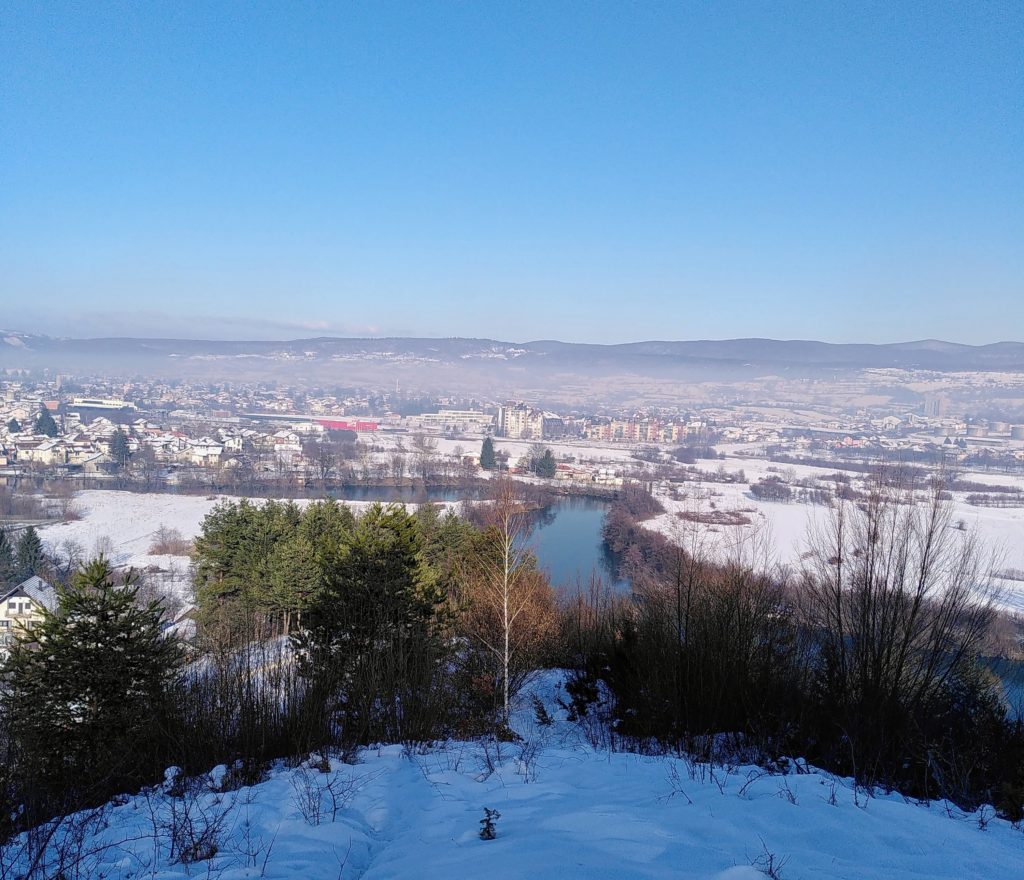
“I worked hard to be good at my job”, Sahar told me of her life before leaving her home. She worked as a tattoo and make-up artist in Tehran, proudly displaying the salon’s name as a tattoo on her arm. “I gained my certification and had all my own equipment.” she explained “Until Bulgaria. In Bulgaria, everything got worse.”
The route from Iran, via Turkey, to Europe, has become more complex. Sahar dreamt of reuniting with her twin sister in Germany and they thought a legal route to the family reunion would be possible from European Union member Bulgaria. “We were in Bulgaria for two and a half years,” she explained, referring to Alirezer. Sahar had met Alirezer on their journey. He, too, is a Christian from Iran – a tall, thin and serious man, he sat calmly that day in the restaurant, speaking quietly on the phone. Life on the road as a single woman is risky. Alirezer and Sahar posed as a couple for her safety. Alirezer explained what happened in Bulgaria with the help of his brother who called us from Australia. “I was claiming asylum and working as a car mechanic, and Sahar was trying to find out how to reach her sister. We realised that there wasn’t a legal way, so we decided to leave on our own.”
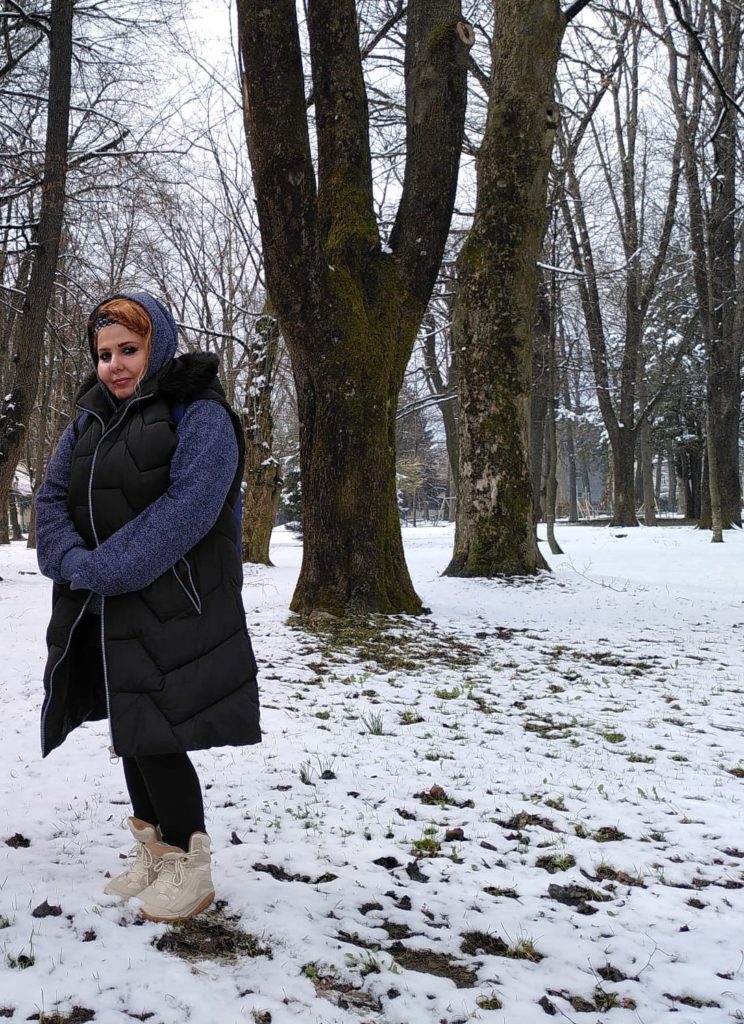
Sahar’s religion wasn’t the only reason she faced persecution in Iran and potentially along her journey – she’s gay. Speaking in a public place in Bosnia, a Muslim country, it wasn’t even safe to bring this up within earshot of local people or other camp residents.
Whilst homosexuality is no longer criminalised in Bosnia, widespread discrimination against same-sex couples is still. Sahar and other Christians I met had experienced issues with some camp residents whose Muslim faith led to more conservative ways of dressing and behaving.
Sahar dreamt of reuniting with her twin sister in Germany and they thought a legal route to the family reunion would be possible from European Union member Bulgaria
Family reunification between EU countries only functions for nuclear family members – the spouse or children of the person applying. Despite Sahar’s sister being financially stable and able to support and help her, there was no legal way to join her without returning to Iran and applying for a Visitor visa. A visa that would be costly to apply for, slow to administrate and likely rejected – as has been the case for other friends of mine.
While attempting to cross the border between Bulgaria and Serbia for the third time, they were apprehended by police and beaten. During their detention, Sahar sustained a head injury, leading to her developing epilepsy. “I pass out, and I have fits; I never used to be like that,” she told me. Not only that, but her valuable tattoo machine was confiscated and both she and Alirezer remained in detention.
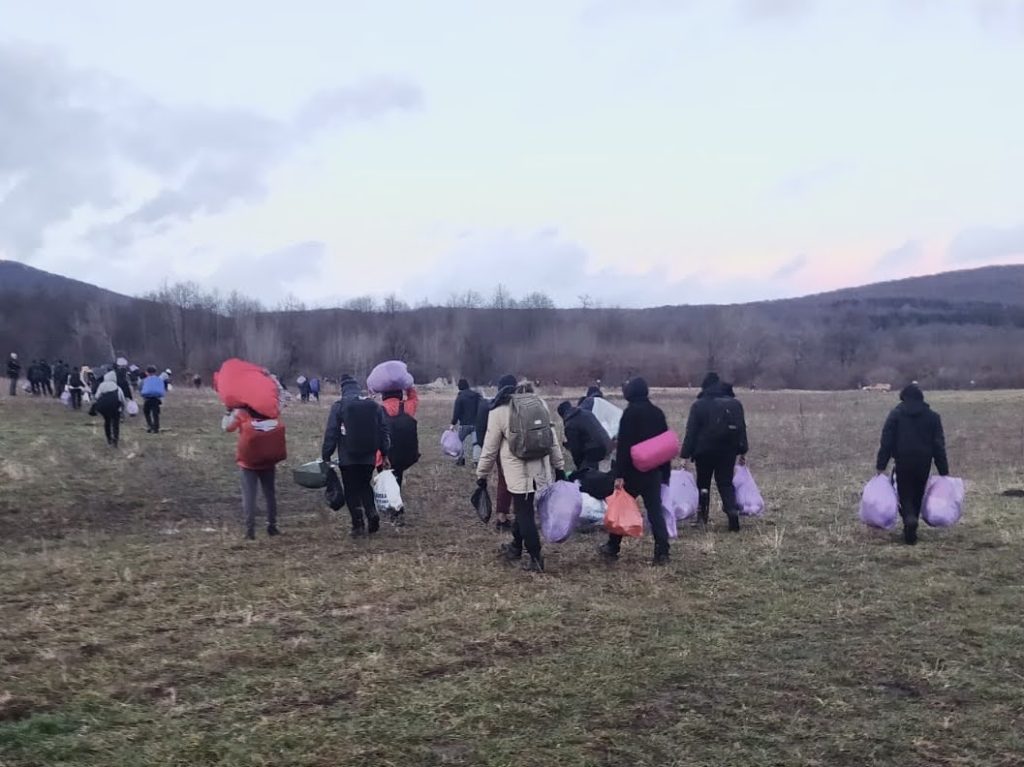
Three years later, the unlikely pair somehow made it to Bosnia. Sahar’s extroversion and small stature contrast with Alirezer’s quiet and calm manner and his tall height. At the edge of the European Union, it should be simple enough to travel from Bihać to Munich; there’s a bus that goes all the way. But not for people without documents. The Croatian border authorities are notoriously violent – and illegal pushbacks occur from the Croatian capital Zagreb as well as so-called ‘chain pushbacks’ from Slovenia and Austria all the way to Bosnia. Sahar, and the hundreds of others who are deported each year, have a legal right to request asylum. Still, the actions of the police mean that people have to hide in trucks, walk through the forests and pay vast sums of money to attempt to reach Italy or Germany without detection. The name for this dangerous journey, however it is undertaken, is ‘the game.’
The Croatian border authorities are notoriously violent – and illegal pushbacks occur from the Croatian capital Zagreb as well as so-called ‘chain pushbacks’ from Slovenia and Austria all the way to Bosnia.
I returned to Bosnia in February 2022. Sahar is in a different camp now. The Bosnian authorities, with EU funding, are attempting to close the camps nearer to communities and move everyone to Lipa Camp. This glorified tent encampment is high on a mountain, more than 25 km from the city. The facilities are basic, the living conditions unappealing, and the ability to try to cross the border hindered.
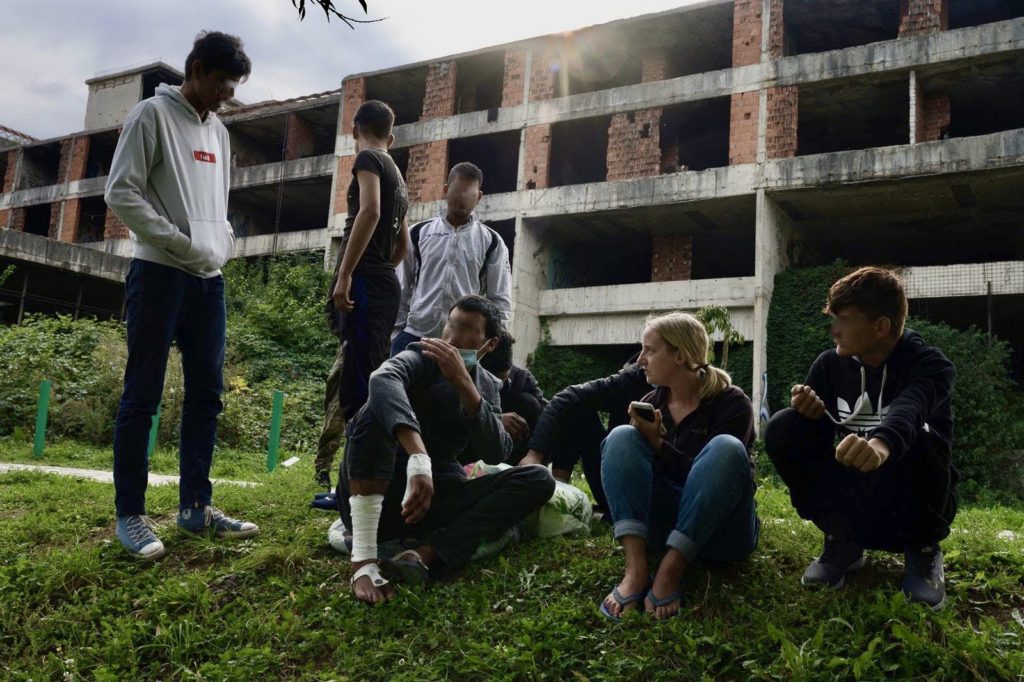
In the centre of Bihac, Hannah with refugees who sleep in abandoned buildings, by Kristien Skeie
Living in Serbian and Bosnian camps has led to poor and interrupted medical treatment for Sahar, and Alirezer also has chronic health issues. “The camps here are no good,” Sahar told me when I met her again at the beginning of this year. “The food isn’t good and you’re not allowed to cook for yourself. They have strict rules like we’re prisoners, but we’ve done nothing wrong.” The rules that she referred to were those at Borici Camp – the accommodation for people considered vulnerable – which is near the centre of Bihać. Camp residents are only allowed to leave during restricted hours. They have none of the normality of shopping and cooking whilst also having to share facilities with many other people. For people with difficult histories and traumatic journeys behind and ahead of them, these conditions do nothing to aid the mental well-being of residents.
“last time, the police found us, and they took our food and water. Then I had a fit and was unconscious, but they deported us anyway.”
I met many people in Bosnia in 2020 and 2021 – almost all of them aren’t there anymore. Not because of legal routes to join family members, but because of being successful at ‘the game’. If you have money, you don’t have to walk the entire way from Bosnia to Italy. But even if you can pay for a car, you still have to cross the border, through the woods, unseen. “We tried and we tried, but I can’t walk far; I just can’t.” Sahar, told me, in visible distress, “last time, the police found us, and they took our food and water. Then I had a fit and was unconscious, but they deported us anyway.” Tears appeared on her face at that moment; the raised and dashed hopes at each attempt weighed heavily on them both. The added dynamic of temporarily relying on each other must make things even harder. Once they reach the EU, they will go their separate ways.
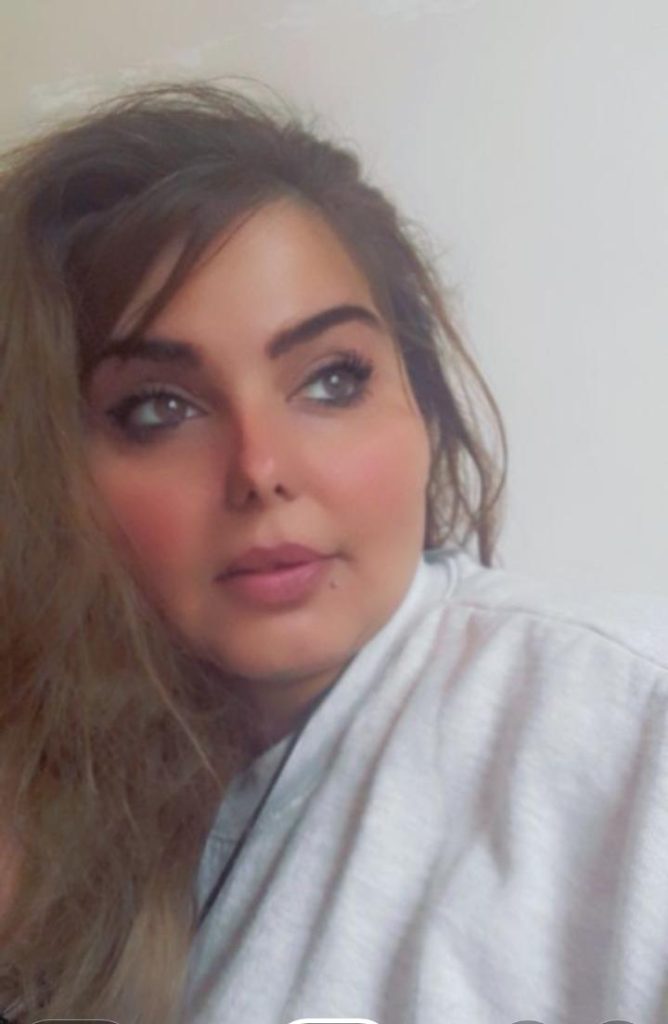
During our conversation in the cafe earlier this year, we discussed any possible legal options left. There was a glimmer of hope that needing medical treatment would enable a temporary visa to Italy, something another mutual friend had benefited from. Anything was worth a try. After that, we just relaxed together. I showed Sahar my tattoos and she showed me hers. “When I’m in Germany when I’ve got a machine again, I’ll make a tattoo for you,” she promised. “I would love that. I can’t wait.” I replied.
When I met Sahar, she used that name, but she wished for her real name to appear in this article. Her name is Fatemeh Khajeh Nasiri. Fatemeh has recently made it to Munich, reunited with her twin sister, and is starting the long asylum process.
To find out more about illegal pushbacks, visit Border Violence Monitoring Network
To volunteer or support work in the Balkans, visit nonamekitchen.org
